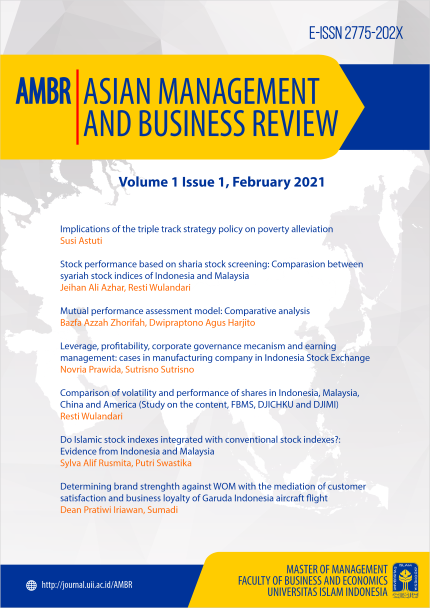Main Article Content
Abstract
The portfolios performance that are develop either a substitute or complement in terms of risk-taking is important information for investors whether the return portfolio could hedge the risk of shock market. An understanding of volatility and the correlation between asset returns over time vary is highly important for investors (both domestic and international) with the sight of diversifying their portfolios for hedging from unexpected risk. The research method uses a DCC MGARCH approach to examine the correlation among two countries in time variant manner to indicate the degree of financial integration. With daily data from April 2012 until December 2017 and use 3 category index (composite, Islamic and conventional) the result shows that Malaysia and Indonesia have strong correlation. Among Islamic, composite and conventional have financial integration, but conventional index in Malaysia have the lowest integration from other index that it makes suitable for diversification. Unfortunately, conventional index that contain non halal product was not suitable for investor that sharp pointed into sharia. The shock in Malaysia’s Index will be perform different from historical or previous return. Contrary with Indonesia’s index, the return probably based on the historical. The implication of this research is we found that the Islamic investor could not have best diversification on the Malaysia and Indonesia market, since the Islamic index was sturdily correlated.
Keywords
Article Details
Copyright (c) 2021 Asian Management And Business Review (AMBR)

This work is licensed under a Creative Commons Attribution-ShareAlike 4.0 International License.
Authors who publish with this journal agree to the following terms:
- Authors retain copyright and grant the journal right of first publication with the work simultaneously licensed under a Creative Commons Attribution-ShareAlike 4.0 International License that allows others to share the work with an acknowledgement of the work's authorship and initial publication in this journal.
- Authors are able to enter into separate, additional contractual arrangements for the non-exclusive distribution of the journal's published version of the work (e.g., post it to an institutional repository or publish it in a book), with an acknowledgement of its initial publication in this journal.
- Authors are permitted and encouraged to post their work online (e.g., in institutional repositories or on their website) prior to and during the submission process, as it can lead to productive exchanges, as well as earlier and greater citation of published work (See The Effect of Open Access).
